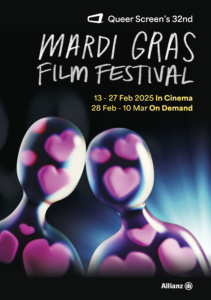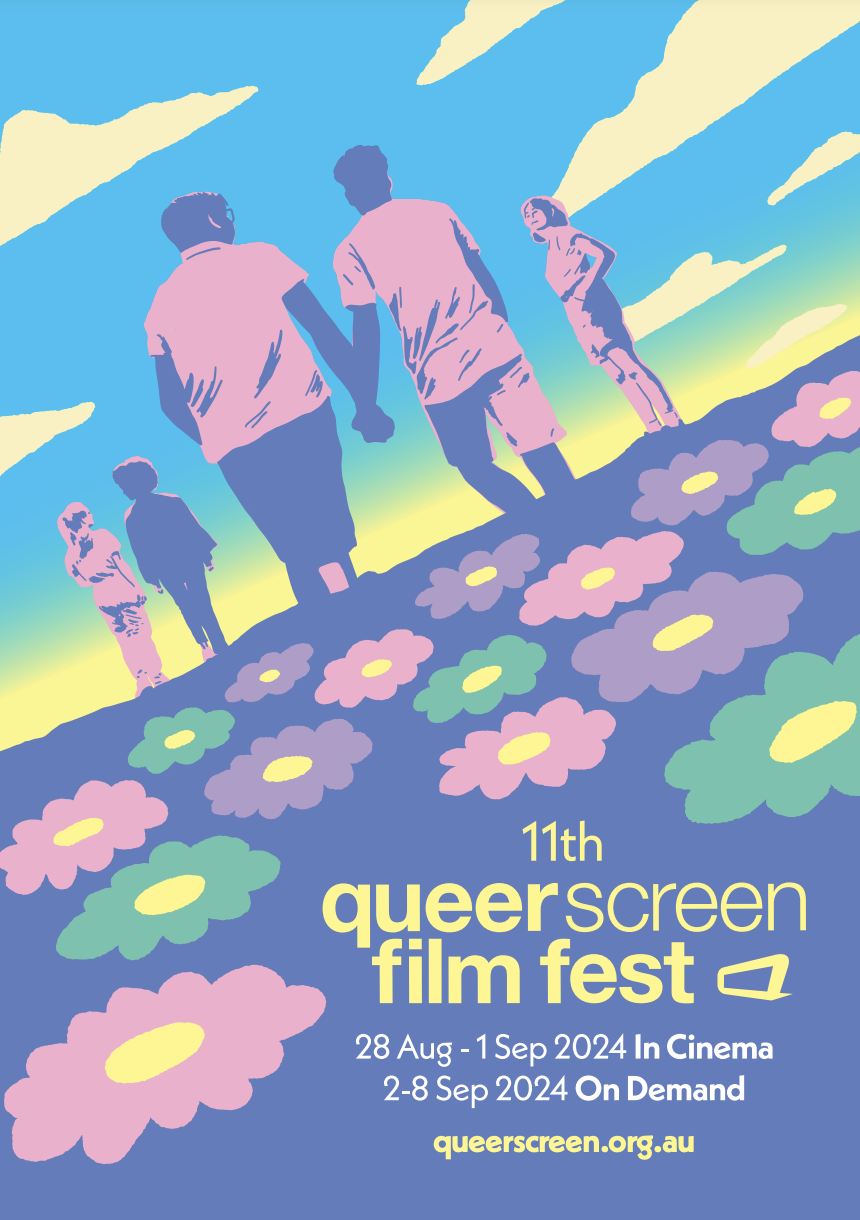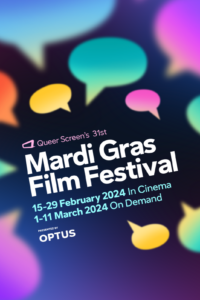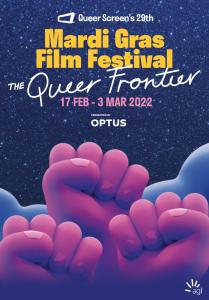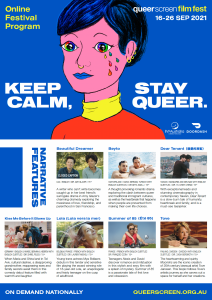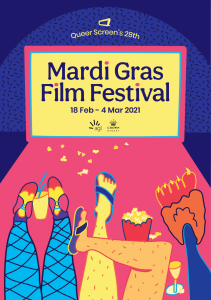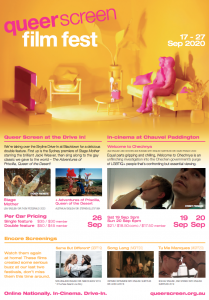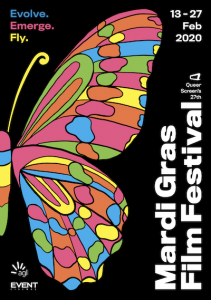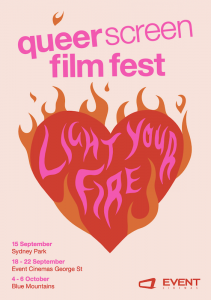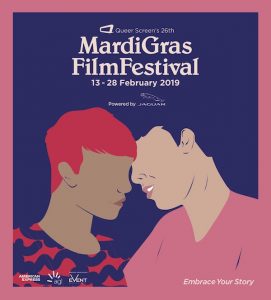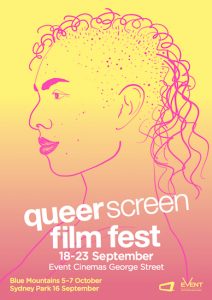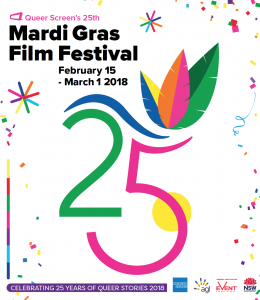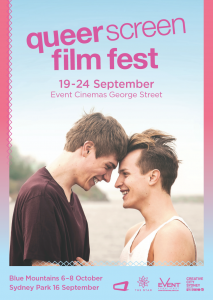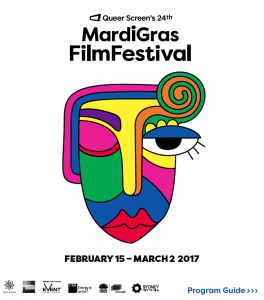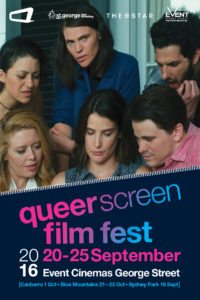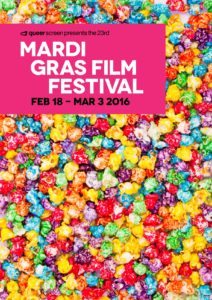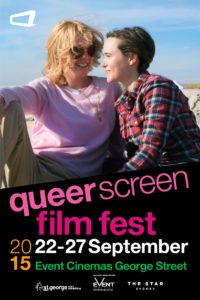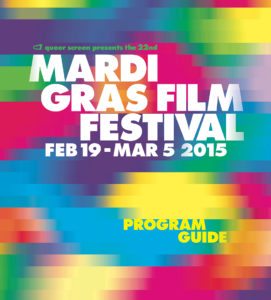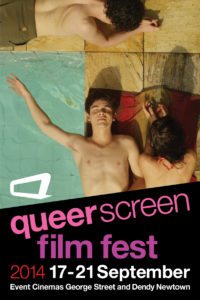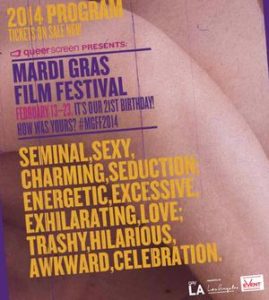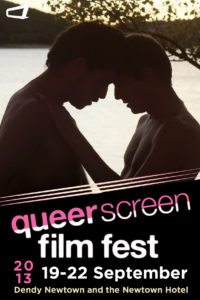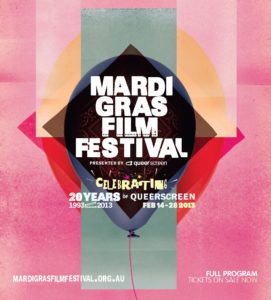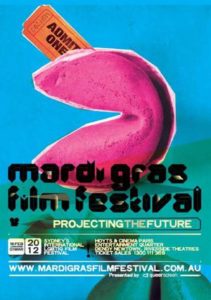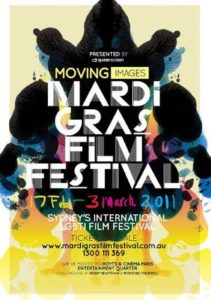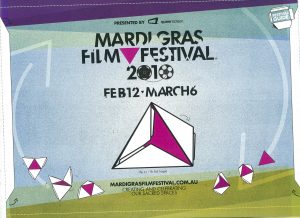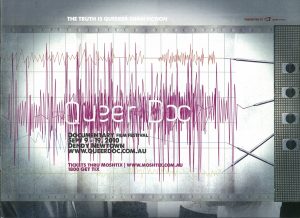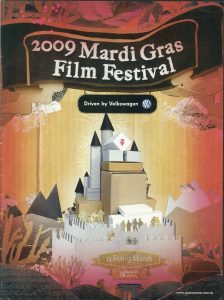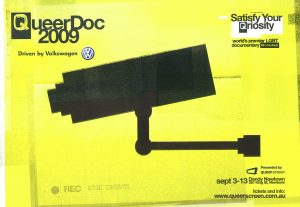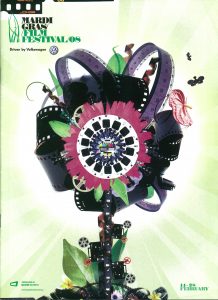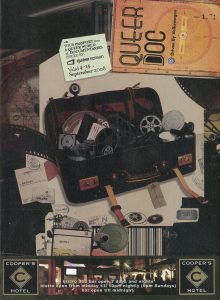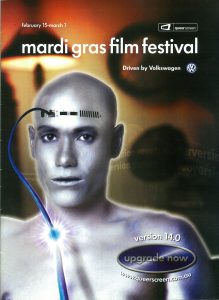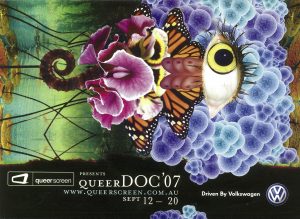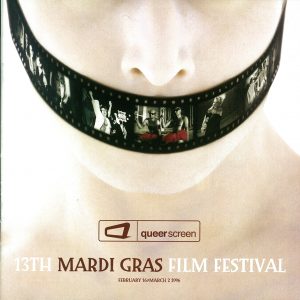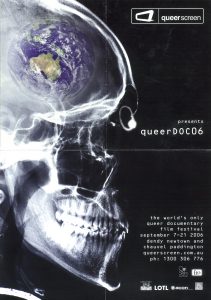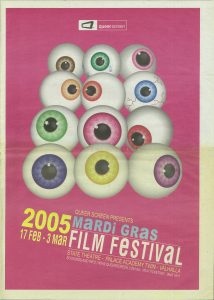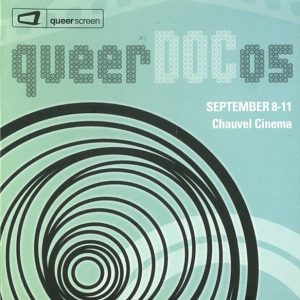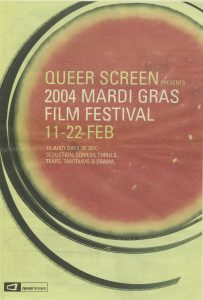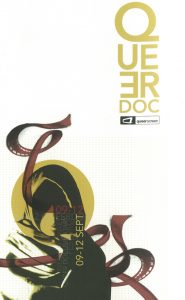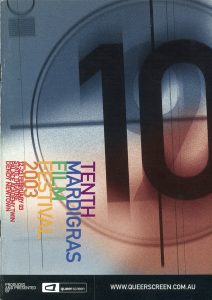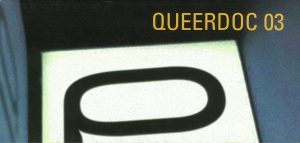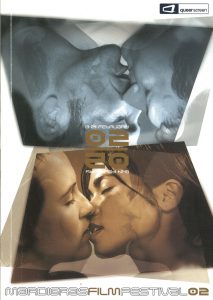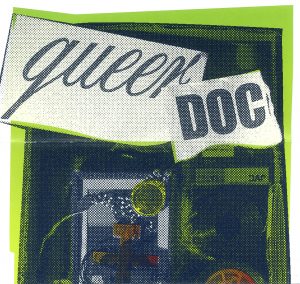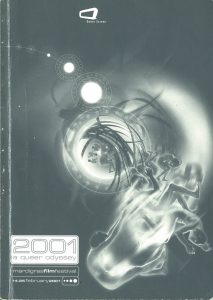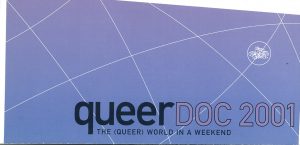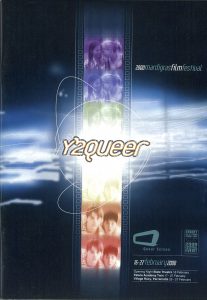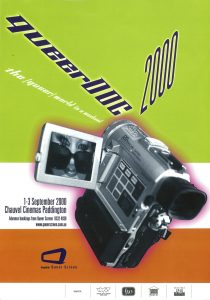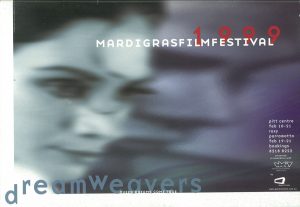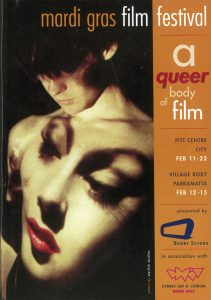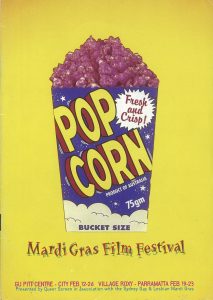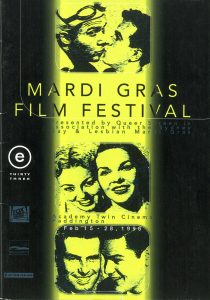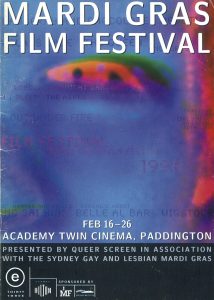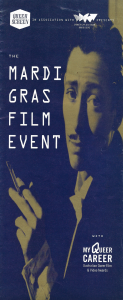
15 Jun Film Festival Archive
Some of the previous Mardi Gras Film Festival, Queer Screen Film Fest and QueerDOC program guides are available to view below.
Mardi Gras Film Festival 2025
Queer Screen Film Fest 2024
In 2024, Queer Screen hosted its 11th Queer Screen Film Fest. The festival continues to grow with 35 fresh films, representing every continent in the world. It spanned 5 days in Sydney, and 7 days on-demand nationwide. Several of the titles premiered at major festivals including Cannes, Berlinale, Venice, SXSW and Toronto. Alongside screenings, we hosted Q&A sessions with local and international guests, and awarded our highest prize pool in the history for Pitch Off! at $20,000 alongside the Gender Matters Taskforce.
Mardi Gras Film Festival 2024
In 2024, we celebrated our 31st Mardi Gras Film Festival #MGFF24. The festival featured an epic 161 films and events spread across 77 unique programs held in Sydney over 15 days from February 15th to 29th, before an on-demand encore of 25 programs from March 1st to 11th, and a tour to the Blue Mountains and Canberra. The theme focused on films that start conversations, encouraging audiences to indulge in a good, old-fashioned post-screening discussion (or debate!). Highlights included the opening night gala ‘Femme,’ which also won the audience award, our first trip to the Sydney Opera House for a night of film and Queer Film Music performed by the Sydney Cello Quartet, and a return to the world’s most beautiful cinema, Westpac OpenAir, for the buzziest queer film of the year, ‘All of Us Strangers.’
Queer Screen Film Fest 2023
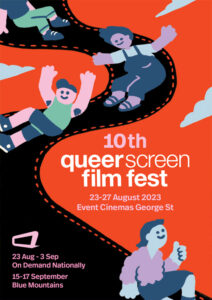
In 2023, Queer Screen celebrated its 30th year and the 10th Queer Screen Film Fest. The festival has grown from 7 films in its first edition to an incredible 37 films across 20 unique programs. It spanned 5 days in Sydney, 3 days in the Blue Mountains, and 12 days on-demand nationwide. The program featured acclaimed films from Cannes, Berlinale, Sundance, Venice, and more. Alongside screenings, we hosted parties, panels, Q&A sessions, and awarded $10,000 to Lizzie Cater for her short film “Sara” in the 6th Queer Screen Pitch Off edition.
Mardi Gras Film Festival 2023
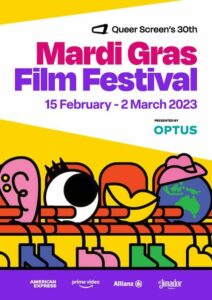
In 2023 we held our 30th Mardi Gras Film Festival (MGFF23) which coincided with Sydney WorldPride and celebrated with a mind-blowing program that promised to awaken all the senses. Screening for 16 days from 15 February to 2 March, MGFF23 was our biggest and highest-audience-rated festival in the past decade, with 166 films across more than 100 sessions in cinema, outdoors and on-demand. Plus, we celebrated with our LGBTIQ+ filmmaking community with hosting panel discussions, workshops, industry networking events, international guests and parties.
Mardi Gras Film Festival 2022
15 days 119 films: thousands of people watching here in Sydney and around the country on demand. Queer Screen’s Mardi Gras Film Festival asked you to explore the Queer frontier. To watch films that and challenge you, excite you, move you, confuse you and inspire you. We asked you to recognise those queer rebels those activists musicians artists who paved the way and created space for all of us to live authentically. We celebrated First Nation stories with Four films about First Nations people – from our opening night film Wildwood through to our documentary Centerpiece Pure Grit. We streamed a fascinating panel on queer First Nations stories, that you can still see on our Facebook and YouTube. We hosted a youth panel and hang out with an incredible bunch of creators offering their expertise for a fabulous group of diverse young people who came from all over Sydney.
Queer Screen Film Fest 2021
Through the great COVID-19 lockdown of 2021 we absolutely loved having the opportunity to bring the world to Australian audiences! We loved sharing films from 17 countries, in 18 different spoken languages, and hosting no less than 22 Australian Premieres! A record breaking audience joined us in our very first 100% On Demand festival and watched over 40 LGBTIQ+ features, documentaries and shorts. Thank you to our guests and filmmakers who joined us for our live Q&A events and Pitch Off event. And thank you to the patrons who joined the great online world to come together for trivia night and the halfway hangout via Zoom. Thanks also to our filmmakers who continue to make, create and reflect a little bit of us on screen.
Mardi Gras Film Festival 2021
Amidst an ongoing health crisis that saw so many film festivals going entirely virtual, Queer Screen’s 28th Mardi Gras Film Festivals was in the incredibly fortunate position to be one of the first to return to cinemas. Kicking off 2021 in style with our opening night film under the stars at Moonlight Cinema in Centennial Park, this year we also expanded the Showcase program strand, with five international narratives, an international documentary, and two Australian narrative features, including performances from the likes of Colin Firth, Stanley Tucci, and rising star Vanessa Kirby.
Screening 94 films over the course of the festival – including 3 world premieres, 60 Australian premieres, and 15 Sydney premieres – with 55% of the program available on-demand online Australia-wide and over 45 sessions and events in Sydney, there were more ways than ever to experience the festival.
Queer Screen Film Fest 2020
It’s no secret that 2020 was a challenging year for the global community, but with it came opportunities to create new ways of delivering a world class film festival to the widest audience possible, and the 8th Queer Screen Film Fest was officially our largest ever. With more films, more screens and the biggest audience we have ever had! 41 films, 29 Australian premieres, 6 online Q&As featuring 17 international guests, 6 local filmmaker pitches, 2 in-cinema screenings, our first Drive-In double feature, and audience members in every state & territory!
Mardi Gras Film Festival 2020
After over 90 screenings and events – which included 27 sold-out sessions, six world premieres, insightful Q&A’s and panels from 9 international guests and countless local filmmakers – the 27th Mardi Gras Film Festival lay witness to the evolution of queer cinema! We had an amazing time showcasing the incredible LGBTIQ+ stories from all over the globe and celebrating and championing the diversity within our community.
Queer Screen Film Fest 2019
The 7th Queer Screen Film Fest was our biggest to date! With 29 LGBTIQ films from 12 countries, including 22 Sydney Premieres over 5 days, we saw record breaking crowds flocking to a range of films which were set to set your soul and heart aflame. We were joined by the delightful Nikki Si’ulepa (writer/director) and Rachel Aneta Wills (producer) from Same But Different: A True New Zealand Love Story at the Australian Premiere screening. Director Laurie Lynd from Killing Patient Zero presented his incredibly insightful documentary and stayed for an extended Q&A hosted by ACON. And we saw another successful Pitch Off! as seven contestants pitched their projects to a panel of experts, vying for a $10,000 cash prize, which William Duan took home for his short film TUĪ NÁ.
Mardi Gras Film Festival 2019
Mardi Gras Film Festival 2019 saw 120 incredible LGBTIQ films, including 75 Australian premieres. We opened with the Canadian coming-of-age film Giant Little Ones, and closed with Rafiki, the first Kenyan film selected for Cannes (and initially banned in its home country). We featured the world premiere of Marco Berger’s The Blonde One, welcomed intersex filmmaker River Gallo for his short film Ponyboi, had a speed networking session for filmmakers, and presented Queer Scream, our first shorts package devoted to horror! Our Audience Awards went to the stunning drama 1985, Aussie doco Becoming Colleen and short film Grace & Betty.
Queer Screen Film Fest 2018
QSFF19 was 11 sold-out films and events, 29 beautiful LGBTIQ films across 15 sessions, Rainbow Families Screening in Sydney Park, the special guest performances and emotional screening of George Michael Freedom: The Director’s Cut, the Australian Premiere of Sydney made film Nothing To Lose, a super fun Auslan Interpreted Q&A with Take That Superfan Dara and film producer Rita Walsh, our international guest Arshad Khan and Queer Screen’s first ever Queer Screen Pitch Off, and our highest attended QSFF to date!
Mardi Gras Film Festival 2018
Queer Screen’s Mardi Gras Film Festival celebrated its 25th year with an audience of 18,000 across 88 screenings and events – which included 20 sold-out sessions, six Australian feature films, three world premieres, visits from 14 international guests and countless local filmmakers! It was a festival which saw our most popular opening film in years (Ideal Home); a look back at some brilliant My Queer Career short films; a preview of 2018’s landmark teen film Love, Simon and the world premiere of the doco Black Divaz which scored two standing ovations!
Queer Screen Film Fest 2017
The 5th Queer Screen Film Fest was an amazing week! Over 4,000 people, 14 features, 6 shorts,1 filmmaker event, 9 sold-out sessions, 9 Australian premieres, 3 free screenings, 1 outdoor screening and 5 festival guests including Zachary Booth, star of opening night film After Louie!
Mardi Gras Film Festival 2017
The 24th Mardi Gras Film Festival was the biggest year in recent Festival history with 21,000 attendees – a 23 per cent increase from 2016 – and 100 screenings and events. We warmly welcomed 40 international guests, including filmmakers, activists, advocates, GLAAD and festival directors from the Asia Pacific Queer Film Festival Alliance. It was amazing to be able to share ideas in the international community – but even more so, it was just plain fun with so many parties, panels and the Opening and Closing Night Galas.
Queer Screen Film Fest 2016
The 4th Queer Screen Film Fest was expanded to include screenings in Canberra and the Blue Mountains, as well as a popular and fun free screening of Inside Out in Sydney Park.
The opening night film was the brilliant Other People by Chris Kelly, and was one of many films to sell out. Another highlight was 2 screenings of Almost Adults, which included a visit by star Elise Bauman. With 4000 people in attendance, two encore screenings, and loads of award winning films, this was our largest QSFF yet.
Mardi Gras Film Festival 2016
Queer Screen’s 23rd Mardi Gras Festival was one of the biggest yet, with 80 screenings and 17,000 people in attendance. For the first time it included a Blue Mountains program.
24 sessions were sold out, and 10 international filmmakers were in town to introduce their films. The audience award for best feature film went to Starting From… Now! by Julie Kalceff, and the My Queer Career prize for Best Film went to The Summer of ABC Burns by Dannika Horvat.
2016 also included a ‘Focus on Sport’ program and screening of the documentary Out to Win, which included a panel featuring Ian Thorpe and Matthew Mitcham.
Queer Screen Film Fest 2015
The 3rd Queer Screen Film Fest featured several Australian Premiere screenings, an Australian Showcase presentation of a new LGBTI film by Tony Ayres, some massive star-studded Hollywood dramas, and the best queer docos from around the world. Attendance was 4,000 people
The opening night film was the tender and interesting Boulevard staring Robin Williams in his final dramatic role. Perhaps even more hotly anticipated was closing night film, Freeheld starring Ellen Page and Julianne Moore. Both nights sold out, as did many others of the 12 screenings including Grandma and Tab Hunter Confidential.
Mardi Gras Film Festival 2015
Queer Screen’s 22nd Mardi Gras Film Festival was another huge year, with an attendance of 15,000 and 20 sold out screenings.
The festival opened with Swiss film The Circle by Stefan Haupt, and closing with Dutch comedy Queen of Amsterdam by Tim Oliehoek. The audience award winner went to Boy Meet Girl by Eric Schaeffer and the winner of My Queer Career Best Film was Hole by Tony Radevski.
Queer Screen Film Fest 2014
The 2nd Queer Screen Film Fest expanded to include 11 sessions of great films and had an attendance of 2,200 people.
The highlight of the festival was opening with Teddy Award winning film The Way He Looks, directed by Daniel Ribeiro, who attended the screening. He also hosted an amazing free event discussing his work and the transition from short films to award-winning features.
Other great screenings included a scratch-and-sniff screening of John Water’s Polyester, Desiree Akhavan’s Appropriate Behavior, and a special screening of Pride, by Matthew Warchus.
Mardi Gras Film Festival 2014
Queer Screen’s 21st Mardi Gras Film Festival impressively had more than half its screenings sold out. Highlights included Croc-A-Dyke Dundee, The Legend of Dawn O’Donnell, Friends of Dorothy, and Out in the Line-up.
Five films made their world premiere, with a further 19 making their Australian premiere. The audience award for feature film went to Bruno Barreto’s Reaching for the Moon, and the My Queer Career award for Best Film went to Brendon McDonall’s All God’s Creatures.
Queer Screen Film Fest 2013
The inaugural Queer Screen Film Fest screened 7 films over 4 fantastic days with our favorite inner-west venue partners, the Dendy Newtown and the Newtown Hotel. The line up took audiences from Cannes winners, to sneak previews and retrospectives. Two such winners were our opening and closing night films Stranger by the Lake (Queer Palm Award and Un Certain Regard for Best Director) and Lawrence Anyways from Xavier Dolan (Queer Palm and Un Certain Regard Award for Best Actress, Suzanne Clément).
The festival was a success with 6 of 7 films sold out. Queer Screen Film Fest has since become a fixture of Queer Screen’s annual calendar.
Mardi Gras Film Festival 2013
Queer Screen’s Mardi Gras Film Festival celebrated its 20th birthday this year. On the opening night we popped our 3D cherry in bringing you A Liar’s Autobiography: The Untrue Story of Monty Python’s Graham Chapman, a hilarious comedy that brought together 14 animation studios.
Head On shared our birthday, turning 15 this year and we celebrated with a screen and Q&A with cast and filmmaker Ana Kokkinos. The winner of Best Film at My Queer Career went to Summer Suit by Bec Peniston-Bird.
Mardi Gras Film Festival 2012
Queer Screen’s 19th Mardi Gras Film Festival opened with the hilarious Dirty Girl, by Abe Sylvia, and closed with Romeos, by Sabine Bernadi. Two weeks, 90 sessions, and a bumper selection of international and local LGBTIQ cinema made for an amazing festival.
Thanks to the amazing support of the Queer Screen community we were able to have an amazingly successful festival. Some of our brilliant films grouped into major themes, including lesbian sci-fi, protecting the future, and sex on screen. Highlights included the highly anticipated Weekend, by Andrew Haigh and With Every Heartbeat by Alexandra-Therese Keining.
Mardi Gras Film Festival 2011
The 18th Mardi Gras Film Festival was packed full of exciting new titles, including previewing nine titles before their commercial releases, and plenty of pictures hot off the screens of Cannes, Berlin, and Sundance Film Festivals.
One Australian premiere was closing night film Kaboom by Greg Araki (Mysterious Skin, Doom Generation), while the festival opened with I Love You Phillip Morris by Glen Ficarra, featuring Jim Carrey at his devious best alongside Ewan McGregor.
Other highlights were the stunning lesbian drama Elena Undone by Nicole Conn and the beautifully poetic story of Alan Ginsberg in Howl by Rob Epstein & Jeffrey Friedman, starring James Franco.
Mardi Gras Film Festival 2010
Queer Screen’s 17th Mardi Gras Film Festival was one of the biggest to date, with over forty-five films and programs in six locations. The festival opened, once again, with the world’s largest competition for locally produced queer short films and closed with the highly anticipated sequel to The Naked Civil Servant, Richard Laxton’sAn English Man in New York.
Other highlights from this year’s festival included the three-hour special program The History of My Queer Career which had a look back at some of the highlights of the competition from the last decade. Audiences also loved And Then Came Lola(dir. Megan Siler and Ellen Siedler), the San Franciscan remake of the seminal German split-narrative film, Run Lola, Run. Russel Mulcahy’s Prayers for Bobby(based off a true story) was an emotional screening looking at a man’s struggle to cope with his sexuality, mother’s religious beliefs and his own mental health. Another surprising and moving highlight from this year was A Single Man. The directorial debut of fashion designer Tom Ford followed George Falconer (Colin Firth) for a single day after the death of his long-time partner, Jim. Following a series of encounters, George has to ultimately decide if there really is meaning to life after Jim.
queerDOC 2010
The last year of queerDOC saw the worlds only queer documentary film festival go out with a bang. The festival opened with I Shot My Love, a confronting look at the relationship between Tomer Heymann, a Jewish man whose grandfather escaped Germany during WWII, and Andreas, a German Dancer who believes his family had ties to the Nazi Party. The documentary is shot beautifully and captures an inspirational portrait of a relationship that transcends prejudice, resentment and fear. Le Tigre: On Tour(dir. Kerthy Fix) was another highlight from the last queerDOC. The documentary follows Le Tigre, an iconic band which grew from the ashes of the Riot Girl movement, on their last ever tour.
Mardi Gras Film Festival 2009
Queer Screen’s Mardi Gras Film Festival screened some truly amazing films in 2009. Tom Gustafson’s Were the World Mine has been described as a modern-day gay Shakespearean musical. It follows Timothy, a gay student in an all-boys high school as he escapes the challenges of being gay in an all-boys high school into a musical world where lessons become chorus lines and bullies become ballet dancers. Another centrepiece of the festival was the Taiwanese film, Drifting Flowers dir. Zero Chou, which followed three different narratives of people coming to terms with their sexuality in Taiwan.
queerDOC 2009
Queer Screen’s 2009 QueerDoc was a weekend of some truly great and eye-opening documentaries. Punch Like a Girl, dirs. Maya Gallas and Justine Pimlott, follows three of Sully’s Gym’s best female boxers as they compete for the title of best boxer. In It Came from Kuchar(dir. Jennifer M Kroot), shifts through the archives of George and Michael Kuchar’s seminal films from the underground film scene of New York in the 60s. In Edie and Thea: A Very Long Engagement (dir. Gréta Olafsdóttir and Susan Muska), the history of the queer community in the states is told through the personal narrative of Edie and Thea’s relationship which started in pre-Stonewall New York and has lasted through the gay rights movement.
Mardi Gras Film Festival 2008
Queer Screen’s fifteenth Mardi Gras Film Festival was a hit with audiences across Sydney, Newtown and Parramatta. With well over sixty films and short film screenings, this year was huge and saw some of the best programs to date. One highlight from this year was the collection, ‘Hybrids’ which saw the screening of films like The Picture of Dorian Gray (dir. Duncan Roy). In this postmodern screen adaptation of Oscar Wilde’s infamous novel about vanity and excess, Dorian Gray has been transported from 1890s London to contemporary Manhattan where drug taking, promiscuity and a fast-fashion world of pretty boys with alluring looks and expensive clothes become new reasons to stay young forever.
This year also saw the screening of South African film, World Unseen(dir. Shamim Sarif). The film, which was entirely written, directed, financed and produced by women, tells the story Miriam and Amina, two Indian migrants to Pretoria, the birthplace of apartheid. Amina is independent, irrepressible and proudly single whereas Miriam is a dutiful, traditional housewife. The two are very different but are eventually united in a dramatic chain of events.
queerDOC 2008
Queer Screen’s 2008 queerDOC had a truly international theme this year, screening more international films in the eleven-day festival than any other preceding queerDOC festival. This year opened with a screening of The Amazing Truth About Queen Raquela(dir. Olaf de Fleur). This globe-trotting documentary follows the Filipina ‘ladyboy’, Queen Raquela’ from street-worker in Cebu to internet celebrity in Paris.
The festival came to a close withFootballer Under Cover(dir. David Assmann and Ayat Najafi), a documentary which follows a largely lesbian Berlin soccer team travel from Germany to Tehran to play the Iranian’s women’s soccer team, who have never been allowed to play with an international team before.
2007 Mardi Gras Film Festival
The 2007 Mardi Gras Film Festival saw Queer Screen partner with the Goethe Institute and Chauvel Cinema to make ‘Queer Kino: A History of German Queer Cinema’. This ‘festival within a festival’ saw the screening of some of the best queer classics of German cinema, including Out Im Kino (Manuela Kay and Axel Schook), the first ever gay feature-length film ever made, and Coming Out(dir. Heiner Carow), the first and only East German gay film.
Other highlights from the festival also include: Loving Annabelle(dir. Katherine Brooks), the British lesbian romance based off the 1930s German classic, Madchen in Uniform; the skilful exploration of the emotional intensity that unfolds between two women in the space between physicality and sexuality is seen in The Gymnast (dir. Ned Farr); and the clash of Indian and British cultures are humorously explored in the romantic comedy Nina’s Heavy Delights(dir. Pratibha Parmar).
queerDOC 2007
The twelve documentaries which made up queerDOC 2007 were drawn together in a collection we called, ‘Wonders of Nature’; this festival was a celebration of the miraculous and marvellous that can be found anywhere.
One such example is John Waters, who is the subject of the documentary, John Waters: This Filthy World. The documentary follows his career as a director from his early work in the 1960s to some of his greater classics. Sydney filmmaker Poppy Stockell’s Searching 4 Sandeepwas another standout from the festival. The documentary follows Poppy’s search for love on the internet and the relationship she develops with Sandeep, an Anglo-Indian Sikh in the British Midlands.
Mardi Gras Film Festival 2006
Queer Screen’s thirteenth Mardi Gras Film Festival was a hit, screening all the best in Queer Cinema. Some highlights included Transamerica, a film about a transsexual woman who must first find her son before she can complete her gender reassignment surgery. The wonderful cinematic tapestry of love, loss and longing, Loggerheads(dir. Tim Kirkman) four different characters, all at different crossroads in their life and all in North Carolina. The hit film, Kinky Boots (dir. Julian Jarrold) was another success from this year. This comedy follows the story of Charlie, who after inheriting his father’s slowly collapsing Northampton shoe business, makes some changes after meeting a sassy drag queen, Lola.
queerDOC 2006
Queer Screen’s sixth queerDOC film festival was titled queerDOC06: Seeing Inside the World Outside. The festival opened with Pic Up the Mic(dir Alex Hinton) which traces the San Franciscan underground queer hip hop scene from its early days in the 1990s to its current explosion, exposing how some are defying the music industry’s most homophobic genre. This year also saw the inclusion of a special event, a screening of The Line of Beauty(dir. Saul Dibb). This Australian premiere of the BBC’s queer adaptation of Alan Hollinghurst’s book, The Line of Beauty, saw the festival come to an end after a week of queer documentaries
Mardi Gras Film Festival 2005
Queer Screen’s 2005 Mardi Gras Film Festival saw a great collection of films from around Australia and the world. The French film, Clara’s Summer (dir. Patrick Grandperret) follows Clara, an inexperienced teenager on summer camp. There she meets Sonia, who has a reputation for being a camp lesbian, with whom she creates her own world within the camp as drink, drugs and relationship dramas quickly begin to take holiday priority.
The German and Canadian film Raspberry Reich(dir. Bruce la Bruce) was another international hit. The outrages film follows Gudrun, an East German who leads a group of anti-war, anti-capitalist revolutionaries. She believes that heterosexual monogamy is a bourgeois idea that must be destroyed to achieve revolution. So, she makes her straight male student revolutionaries have sex with each other.
queerDOC 2005
Queer Screen’s 2005 queerDOC was a short but great festival. With only ten documentaries, the festival covered everything from the creation of queer communities to queer family life.
Gay Sex in the 70’s (dir. Joseph Lovett) combines interviews with activists and queer personalities with remarkable archival footage to show how the New York gay community started.
Little Man (dir. Nicole Conn) is the emotional story of Nicolas, a baby born 100 days premature. This extremely intimate documentary follows his mothers as they confront challenges they never thought they would face.
Mardi Gras Film Festival 2004
Queer Screen’s eleventh Mardi Gras Film Festival was twelve juicy days of sex, seduction, comedy, thrills, tears, tantrums and drama with over forty-five films in four locations. Camp(dir. Todd Graff) follows the drama, the romance and the singing at a summer camp for theatre. Goldfish Memory (dir. Liz Gill) follows the lives of several different mainly young, manly gay queer singles falling in and out of love with each other in Ireland. And, Mango Kiss (Sascha Rice) is a hilarious romantic comedy of errors in San Francisco.
queerDOC 2004
Queer Screen’s forth queer documentary festival went off to a good start with The Tasty Bust Reunion(dir. Stephen Maclean). This is the story of Australia’s Stonewall, 463 queers who were having a great time in the Tasty nightclub ten years ago, until a large contingent of Melbourne’s finest cops busted in to disturb the night’s festivities.
The six-minute-long documentary Transgression(dir. Dean Francis) had its world premiere at queerDoc04. The documentary follows a 19-year-old student at Sydney University who was born male but identifies female. In six minutes it says as much about gender identity as many films do in ninety.
Mardi Gras Film Festival 2003
Queer Screen’s tenth Mardi Gras Film Festival was an absolute highlight of the achievements queer filmmakers had made in the last ten years. The festival opened with The Trip, actor turned director Miles Swain’s first feature-length film. The film follows a sexually repressed republican and an openly gay activist as their relationship develops over a decade.
Also in this festival was Billy Hayes’ film, Cock and Bull Story, an intense and passionate film exploring male friendship and boxing. There was also the moving documentary about raising children in a lesbian relationship, Swimming Upstream(dir. Jennifer Freedman) which covers the joys and challenges of lesbian parenting.
queerDOC 2003
Queer Screen’s third queerDOC had over twenty-five documentaries screened in only three days. This year the festival opened with a selection of non-fiction films with a lighter touch. Homemade History – The Home Movies of Ken Garrahy(dir. Robert Herbert) was the first to be screened. The film was a compilation of footage from Sydney’s camp society in the 1960s.
Screened alongside it was Matzo Maidels, (dir. Jenni Olsen, Julie Dorf & Monica Nolam), a series of short clips of lesbian erotica from 1927 with comic commentary and the short mockumentary, Teaching Teo, a short and comic take on how to raise a child Berkley-lesbian style.
Mardi Gras Film Festival 2002
The 2002 Mardi Gras Film Festival went off to a great start with a screening of The Fluffer(dir. Richard Glatzer and Wash West). The film portrays the soft underbelly of the porn industry and features liberal doses of sex, murder, deceit and obsession.
The festival ended on a high too with a screening of the outrageously entertaining By Hook or By Crook(dir. Silas Howard and Harry Dodge). The film follows to butch dykes, Shy and Valentine. One wants to make it big in the world of crime and the other wants to find her birth mother. The film follows the two as they set out on a haphazard and hilarious criminal career.
queerDOC 2002
The 2002 queerDOC opened Ruthie and Connie: Every Room in the House(dir. Deborah Dickson). The documentary, which has won best documentary at the Seattle Film Festival, the Miami Gay and Lesbian Film Festival and the Nashville Film Festival, follows the story of two women, Ruthie and Connie. Both were respectable housewives, active members of their Jewish community in Brooklyn and raising their respective children with their respective husbands… until they fell in love.
Also opening the festival this year was the short Australian documentary, Your Brother, My Tidda(dir. Kelrick Martin). The film tells the story of two Aboriginal men coming out to their families and living with HIV.
Mardi Gras Film Festival 2001
Queer Screen’s 2001 Mardi Gras Film Festival was full of great classics. In the closing film, If These Walls Could Talk 2(dir. Jane Anderson, Martha Coolidge and Anne Heche), three generations of lesbians inhabit the same house. The first part of the film, set in 1961, an elderly woman grieves the loss of her long-time lover. In the second part, set in 1972, a college student finds her feminist ideals challenged when she finds herself attracted to a local working class butch woman. And in the third part, set in the current day, a couple try to have a baby.
Also in the festival was Chutney Popcorn(dir. Nisha Ganatra). The film follows Reena and Lisa, a couple in New York, as Reena decides to carry her sister’s baby.
queerDOC 2001
Queer Screen’s 2001 queerDOC screened several interesting documentaries on a wide variety of topics. Some of the standouts included: Undetectable (dir. Jay Corcoran), an eye-opening documentary which follows six HIV positive women and men as they take different paths in their treatment.
The popular documentary, Out in Nature: Homosexual Behaviour in the Animal Kingdom(dirs. Jessica Menendez, Bertrand Loyer and Stephane Alexandresco) is a ground-breaking look at a subject which scientists have deliberately overlooked.
Mardi Gras Film Festival 2000
The Mardi Gras Film Festival commenced in Parramatta this year with a screening of the romantic comedy, Trick(dir. Jim Fall). The film follows two men who, whilst trying to find a quiet place to be together, find themselves constantly interrupted by other people over the course of one night.
queerDOC 2000
Queer Screen’s first queerDOC commenced with a screening of Paragraph 175(dir. Rob Epstein and Jeffrey Friedman). This emotional and moving film explores a subject that had been largely ignored by historians: the persecution of gay and bisexual men under the Nazi regime. The film features several interviews with survivors who share their stories of detention, torture and reintegration alongside never before seen archival footage.
This year also saw the immensely popular documentary,The Brandon Teena Story(dirs. Susan Muska and Greta Olafsdottir) on which the Academy Award-winning film, Boys Don’t cry, was based. The film follows the story of the attractive and charismatic Brandon Teena who arrived in Falls City, Nebraska in 1993. Three weeks later his ‘true’ identity was revealed as female and he became the victim of many transphobic crimes.
Mardi Gras Film Festival 1999
This year’s festival opened with Relax, It’s Just the Sex(dir. P J Castellaneta), a comedic yet emotional narrative of a group of friends who struggle to stay close to each other following a gay bashing.
Mardi Gras Film Festival 1998
Queer Screen’s 1998 Mardi Gras Film Festival marked the twentieth anniversary of the screening of Word is Out at the Paris Theatre in 1978, a film which foreshadowed the events that would later become the first Mardi Gras in June of that year. To mark the twentieth anniversary of that screening, the festival this year screened some queer classics which have played an important role in the lives of many over the last twenty years. These included Witches and Faggots – Dykes and Poofters, The Word is Out and some great Australian shorts.
This year also saw It’s Our ABC Too, a special event commissioned by Queer Screen to mark twenty years of queers on the ABC.
Mardi Gras Film Festival 1997
This year saw part of the festival move to Parramatta, bringing films to the West that wouldn’t otherwise be screened outside the city area. This festival also saw a great international line-up with An Actor’s Revenge(dir. Kon Ichikawa), a film whose protagonist is an onnagata (female impersonator) in a nineteenth-century Kabuki theatre troupe.
Also screened this year was the ground-breaking Broken Branches (dir. Park Jae-ho) from South Korea. This film, which follows the life of a closeted gay man in Seoul, is the first Korean film to depict gay life in Korea.
Mardi Gras Film Festival 1996
Queer Screen’s Mardi Gras Film Festival was huge this year with over seventy films screened. Among those which stood out were: Anatomy of Desire(dir. Jean-Francis Monette and Peter Tyler-Boullata), an interesting film which observes the role science has had in shaping society’s understanding of homosexuality in the twentieth century.
Mardi Gras Film Festival 1995
This year’s festival opened with a screening of the romantic comedy Strawberry and Chocolate (dirs. Thomás Gutiérrez Alea and Juan Carlos Tabio).
The film Libera(dir. Pappi Corsicato) tells a story of family struggles and the challenges of conformity in Naples. Told through the eyes of three women, this film offers a glimpse at the unseen lives of the Neapolitans.
Mardi Gras Film Festival 1994
Queer Screen’s first Mardi Gras Film Festival opened with the classic Roger Spottiswooden film And the Band Played On. Screening a selection of features and documentaries from around the world, the festival also saw three sessions of what has now become Australia’s richest LGBTIQA+ Short Film Competition My Queer Career.


